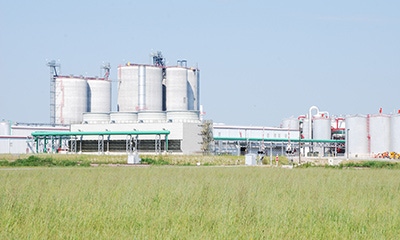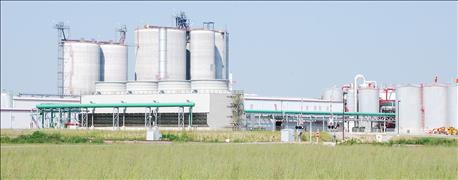
Last week, Sens. Chuck Grassley, R-Iowa and Maria Cantwell, D-Wash. introduced new federal legislation to extend the biodiesel tax credit through 2019 and reform it by making it a domestic producer’s credit instead of a blender’s credit. Twelve additional U.S. senators, including Iowa’s Joni Ernst, co-sponsored the bipartisan legislation, a top priority for the biodiesel industry.
“These reforms would support U.S. biodiesel producers and stop subsidizing foreign biodiesel producers,” says Grassley. “There’s no reason for foreign producers to reap the benefit of a U.S. tax incentive when so many foreign governments heavily subsidize their own biodiesel industries.”

STOP BIODIESEL IMPORTS: “Extension and modification of the federal biodiesel tax credit are crucial to protecting American jobs and energy security,” says IRFA’s Monte Shaw. Iowa’s two U.S. Senators are pushing for an extension of the tax credit and to reform it.
New bill offers added benefit of saving U.S. taxpayers money
The reforms, emphasizing support for domestic producers, would have the added benefit of saving U.S. taxpayers money over the current tax credit. “Sen. Grassley has our gratitude and thanks as an industry for standing up for biodiesel,” says Grant Kimberley, executive director of the Iowa Biodiesel Board, and director of market development for the Iowa Soybean Association.
The bill follows similar legislation Sens. Grassley and Cantwell have introduced previously, including last year when it cleared the Senate Finance Committee without objection. Joining Grassley and Cantwell to co-sponsor the Biodiesel Tax Incentive Reform and Extension Act of 2016 are Sens. Pat Roberts, Heidi Heitkamp, John Thune, Sheldon Whitehouse, Mark Kirk, Martin Heinrich, Joni Ernst, Joe Donnelly, Roy Blunt, Mazie Hirono, Al Franken and Patty Murray.
Imports of biodiesel into the U.S. are surging
The bill would modify the $1 per gallon biodiesel blenders’ tax credit by changing it to a producers’ credit and also extend it for three years, notes Monte Shaw, executive director of the Iowa Renewable Fuels Association (IRFA). He adds, “We at IRFA applaud Sen. Grassley for leading the charge, and his colleagues, such as Sen. Joni Ernst, for working on this common sense modification and extension that will support American jobs and energy security.
“Just yesterday, the Energy Information Administration released its latest estimates showing that U.S. biodiesel production could actually take a step backwards this year,” says Shaw. “This is due to the latest Department of Commerce numbers showing biodiesel imports are surging, reaching a two-and-a-half-year high in May and currently making up about one-third of the U.S. biodiesel market. These soaring imports, coupled with the EPA’s lackluster Renewable Fuel Standard proposal, demonstrate the need to modify the credit to a domestic producers’ incentive and provide some longer-term certainty for the U.S. biodiesel industry.”
Current biodiesel tax incentive due to expire at end of 2016
After being reinstated in late 2015, the current federal biodiesel tax incentive is set to expire again on December 31, 2016.
Also last week, the Iowa Renewable Fuels Association submitted comments on the proposed Renewable Fuel Standard (RFS) volumes, urging the U.S. Environmental Protection Agency to enforce the law as Congress intended and set the final targets at 15 billion gallons for corn-based ethanol in 2017 and at least 2.5 billion gallons for biomass-based diesel in 2018. To read IRFA’s full comments, please click here.
According to a recent IRFA study, Iowa’s renewable fuels industry accounts for more than $4.6 billion of Iowa GDP, generates $2.3 billion in income for Iowa households and supports more than 43,000 jobs throughout all sectors of the Iowa economy.
NBB releases statement on Senate biodiesel tax legislation
The National Biodiesel Board released the following statement from vice president of federal affairs Anne Steckel after Sens. Grassley and Cantwell introduced the new legislation to extend the biodiesel tax incentive through 2019 and reform it as a domestic production credit:
“Biodiesel and renewable diesel producers around the country are yet again facing what effectively amounts to a tax increase in less than six months. Congress can keep that from happening by passing this bill. It will give producers the certainty they need to hire and grow in the coming years. It will continue our success in diversifying the diesel market and reducing our dependence on petroleum. And it will help clean the air by cutting carbon emissions and other pollution.”
Foreign biodiesel producers take advantage of U.S. tax loophole
“It also will appropriately reform this incentive by applying it only to domestic biodiesel production, ending a growing practice where foreign producers are taking advantage of our tax system. Our tax law should not be incentivizing foreign fuel, and this bill fixes that loophole so that we’re stimulating jobs and economic development here at home.
“On behalf of biodiesel and renewable diesel producers across the country, we want to thank Sens. Chuck Grassley, R-Iowa, and Maria Cantwell, D-Wash., for their continued leadership on this issue as well as the additional co-sponsors of the bill. We urge Congress to take up this bill and pass it as quickly as possible so we can continue expanding biodiesel’s role as the leading Advanced Biofuels in America.”
The bill, which can be found at biodiesel.org , follows similar legislation Sens. Grassley and Cantwell have introduced previously, including last year when it cleared the Senate Finance Committee without objection. It also mirrors House legislation (H.R. 5240) introduced by Reps. Kristi Noem, R-S.D. and Bill Pascrell, D-N.J.
Nearly one-third of U.S. biodiesel market soaked by foreign fuel
After expiring on Dec. 31, 2014, the $1-per-gallon biodiesel tax incentive was reinstated in late 2015 and is slated to expire again on Dec. 31, 2016. Under the current “blender’s” structure of the incentive, foreign biodiesel imported to the U.S. and blended with petroleum diesel in the U.S. is eligible for the tax incentive. Increasingly, foreign biodiesel producers are taking advantage of the U.S. incentive by shipping their product here. In 2015 alone, some 670 million gallons of biodiesel and renewable diesel was imported to the U.S., making up nearly a third of the U.S. market.
Made from an increasingly diverse mix of resources such as soybean oil, recycled cooking oil and animal fats, biodiesel is a renewable, clean-burning diesel replacement that can be used in existing diesel engines. It is the first and only commercial-scale fuel produced across the U.S. to meet the EPA’s definition as an Advanced Biofuel - meaning the EPA has determined that biodiesel reduces greenhouse gas emissions by more than 50% when compared with petroleum diesel. Americans used nearly 2.1 billion gallons of biodiesel last year.
NBB is the U.S. trade association representing the biodiesel and renewable diesel industries, including producers, feedstock suppliers and fuel distributors. A recent economic study found that the industry supports nearly 48,000 jobs nationwide. For more details visit americasadvancedbiofuel.com or biodiesel.org
About the Author(s)
You May Also Like




